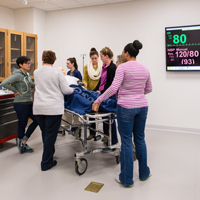Nurse Educator Students Reflect on Impact of Simulator, NEIP Grant
August 10, 2018

One year after a Missouri Nursing Education Incentive Program (NEIP) grant award supported Webster University in purchasing a SIMman 3G human simulator, Webster nursing students are thrilled with the impact it has had on their preparation to become nurse educators.
The goal of the grant was to prepare graduate nursing students as nurse educators to help address the nationwide nursing faculty shortage by contributing to the use of simulation-based learning experiences in prelicensure nursing programs. The grant enabled the training of eight Webster faculty members on the operation of the simulator, and implementation of two simulation boot camps with Master of Science in Nursing educator tract nursing students.
Simulation has been found to be a safe and effective way to teach clinical skills and replace some training hours that historically took place in the hospital setting. The boot camps enhanced the students’ understanding of how to use simulation as a teaching tool and consisted of a pre-simulation class session, a full-day (Saturday) boot camp, and a post-simulation class discussion.
Students role-played debriefing scenarios, learned to turn-on and operate the human simulator, practiced moulage (making various wounds and body excretions), and ran simulation scenarios.
"All in all, this day was filled with beneficial knowledge that will really enhance the start of my nurse educator role," said one student after the boot camp. "I would hope this simulation boot camp will be utilized in future cohorts and possibly extended to other nurse educator tracks around the state. The method and approach utilized was useful as they [the faculty] took a broad and overwhelming topic and made it manageable, doable, likeable and approachable for anyone with lack of experience, knowledge, and confidence in feeling they could tackle simulation.”
Students also appreciated the impact on the learning environment.
“On top of the amazing role-play activity, I learned how much time and effort goes into creating and running a simulation," said another student. "I learned to make the classroom a safe learning environment; one in which students feel comfortable to ask questions, to talk through things, and ultimately learn what they are there to learn,”
The boot camps were so successful the nursing faculty have decided to continue them with future nurse educator graduate students.
